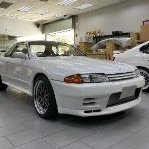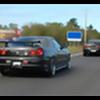Good Tow Cars?
Announcements
-
Similar Content
-
Latest Posts
-
The other problem was one of those "oh shit we are going to die moments". Basically the high spec Q50s have a full electric steering rack, and the povo ones had a regular hydraulic rack with an electric pump. So couple of laps into session 5 as I came into turn 2 (big run off now, happily), the dash turned into a christmas tree and the steering became super heavy and I went well off. I assumed it was a tyre failure so limped to the pits, but everything was OK. But....the master warning light was still on so I checked the DTCs and saw – C13E6 “Heat Protection”. Yes, that bloody steering rack computer sitting where the oil cooler should be has its own sensors and error logic, and decided I was using the steering wheel too much. I really appreciated the helpful information in the manual (my bold) POSSIBLE CAUSE • Continuing the overloading steering (Sports driving in the circuit etc,) “DATA MONITOR” >> “C/M TEMPERATURE”. The rise of steering force motor internal temperature caused the protection function to operate. This is not a system malfunction. INSPECTION END So, basically the electric motor in the steering rack got to 150c, and it decided to shut down without warning for my safety. Didn't feel safe. Short term I'll see if I can duct some air to that motor (the engine bay is sealed pretty tight). Long term, depending on how often this happens, I'll look into swapping the povo spec electric/hydraulic rack in. While the rack should be fine the power supply to the pump will be a pain and might be best to deal with it when I add a PDM.
-
And finally, 2 problems I really need to sort. Firstly as Matt said the auto trans is not happy as it gets hot - I couldn't log the temps but the gauge showed 90o. On the first day I took it out back in Feb, because the coolant was getting hot I never got to any auto trans issues; but on this day by late session 3 and then really clearly in 4 and 5 as it got hotter it just would not shift up. You can hear the issue really clearly at 12:55 and 16:20 on the vid. So the good news is, literally this week Ecutek finally released tuning for the jatco 7 speed. I'll have a chat to Racebox and see what they can do electrically to keep it cooler and to get the gears, if anything. That will likely take some R&D and can only really happen on track as it never gets even warm with road use. I've also picked up some eye wateringly expensive Redline D6 ATF to try, it had the highest viscosity I could find at 100o so we will see if that helps (just waiting for some oil pan gaskets so I can change it properly). If neither of those work I need to remove the coolant/trans interwarmer and the radiator cooler and go to an external cooler....somewhere.....(goodbye washer reservoir?), and if that fails give up on this mad idea and wait for Nissan to release the manual 400R
-
So, what else.... Power. I don't know what it is making because I haven't done a post tune dyno run yet; I will when I get a chance. It was 240rwkw dead stock. Conclusion from the day....it does not need a single kw more until I sort some other stuff. It comes on so hard that I could hear the twin N1 turbos on the R32 crying, and I just can't use what it has around a tight track with the current setup. Brakes. They are perfect. Hit them hard all day and they never felt like having an issue; you can see in the video we were making ground on much lighter cars on better tyres under brakes. They are standard (red sport) calipers, standard size discs in DBA5000 2 piece, Winmax pads and Motul RBF600 fluid, all from Matty at Racebrakes Sydney. Keeping in mind the car is more powerful than my R32 and weighs 1780, he clearly knows his shit. Suspension. This is one of the first areas I need to change. It has electronically controlled dampers from factory, but everything is just way too soft for track work even on the hardest setting (it is nice when hustling on country roads though). In particular it rolls into oversteer mid corner and pitches too much under hard braking so it becomes unstable eg in the turn 1 kink I need to brake early, turn through the kink then brake again so I don't pirouette like an AE86. I need to get some decent shocks with matched springs and sway bars ASAP, even if it is just a v1 setup until I work out a proper race/rally setup later. Tyres. I am running Yoko A052 in 235/45/18 all round, because that was what I could get in approximately the right height on wheels I had in the shed (Rays/Nismo 18x8 off the old Leaf actually!). As track tyres they are pretty poor; I note GTSBoy recently posted a porker comparo video including them where they were about the same as AD09.....that is nothing like a top line track tyre. I'll start getting that sorted but realistically I should get proper sized wheels first (likely 9.5 +38 front and 11 +55 at the rear, so a custom order, and I can't rotate them like the R32), then work out what the best tyre option is. BTW on that, Targa Tas had gone to road tyres instead of semi slicks now so that is a whole other world of choices to sort. Diff. This is the other thing that urgently needs to be addressed. It left massive 1s out of the fish hook all day, even when I was trying not too (you can also hear it reving on the video, and see the RPM rising too fast compared to speed in the data). It has an open diff that Infiniti optimistically called a B-LSD for "Brake Limited Slip Diff". It does good straight line standing start 11s but it is woeful on the track. Nismo seem to make a 2 way for it.
-
Also, I logged some data from the ECU for each session (mostly oil pressures and various temps, but also speed, revs etc, can't believe I forgot accelerator position). The Ecutek data loads nicely to datazap, I got good data from sessions 2, 3 and 4: https://datazap.me/u/duncanhandleyhgeconsultingcomau/250813-wakefield-session-2?log=0&data=7 https://datazap.me/u/duncanhandleyhgeconsultingcomau/250813-wakefield-session-3?log=0&data=6 https://datazap.me/u/duncanhandleyhgeconsultingcomau/250813-wakefield-session-4?log=0&data=6 Each session is cut into 3 files but loaded together, you can change between them in the top left. As the test sessions are mostly about the car, not me, I basically start by checking the oil pressure (good, or at least consistent all day). These have an electrically controlled oil pump which targets 25psi(!) at low load and 50 at high. I'm running a much thicker oil than recommended by nissan (they said 0w20, I'm running 10w40) so its a little higher. The main thing is that it doesn't drop too far, eg in the long left hand fish hook, or under brakes so I know I'm not getting oil surge. Good start. Then Oil and Coolant temp, plus intercooler and intake temps, like this: Keeping in mind ambient was about 5o at session 2, I'd say the oil temp is good. The coolant temp as OK but a big worry for hot days (it was getting to 110 back in Feb when it was 35o) so I need to keep addressing that. The water to air intercooler is working totally backwards where we get 5o air in the intake, squish/warm it in the turbos (unknown temp) then run it through the intercoolers which are say 65o max in this case, then the result is 20o air into the engine......the day was too atypical to draw a conclusion on that I think, in the united states of freedom they do a lot of upsizing the intercooler and heat exchanger cores to get those temps down but they were OK this time. The other interesting (but not concerning) part for me was the turbo speed vs boost graph: I circled an example from the main straight. With the tune boost peaks at around 18psi but it deliberately drops to about 14psi at redline because the turbos are tiny - they choke at high revs and just create more heat than power if you run them hard all the way. But you can also see the turbo speed at the same time; it raises from about 180,000rpm to 210,000rpm which the boost falls....imagine the turbine speed if they held 18psi to redline. The wastegates are electrically controlled so there is a heap of logic about boost target, actual boost, delta etc etc but it all seems to work well
-
hahah when youtube subscribers are faster than my updates here. Yes some vid from the day is up, here: Note that as with all track day videos it is boring watching after the bloopers at the start. The off was a genuine surprise to me, I've literally done a thousand laps around the place and I've never had instability there; basically it rolled into oversteer, slipped, gripped and spat me out. On the way off I mowed down one of the instructor's cones and it sat there all day looking at me with accusing cone eyes as I drove past. 1:13:20 was my fastest lap, and it was in the second session, 3rd lap. It (or me!) got slower throughout the day as it got hotter.
-





Recommended Posts
Create an account or sign in to comment
You need to be a member in order to leave a comment
Create an account
Sign up for a new account in our community. It's easy!
Register a new accountSign in
Already have an account? Sign in here.
Sign In Now